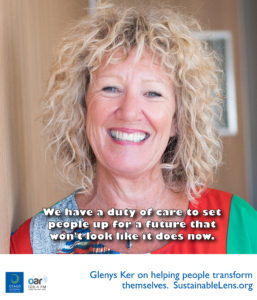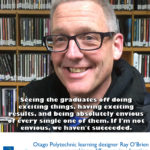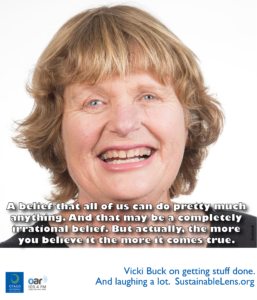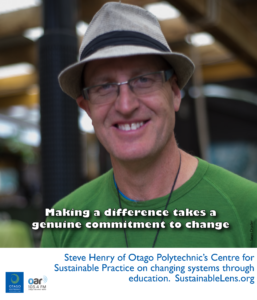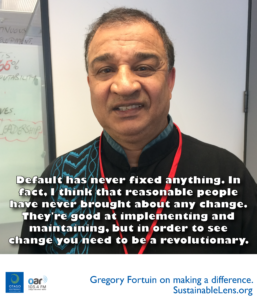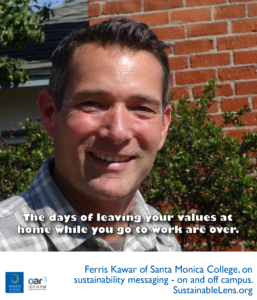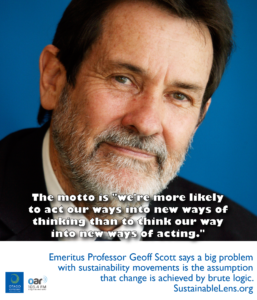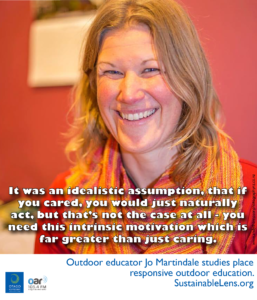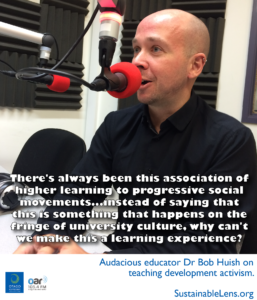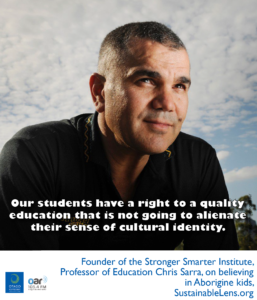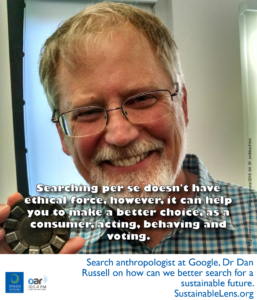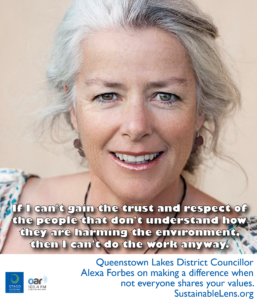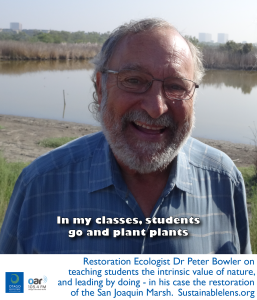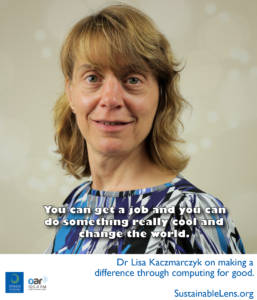
 Don’t let your personal and your professional life be separate on things that you feel passionate about. If you really feel something is important, work out how to bring it in.
Dr Lisa Kaczmarczyk has an adjunct position at Harvey Mudd and runs a business specializing in the evaluation of computer science and engineering education programmes. Â Â Her book from a couple of years ago is Computing and Society: Computing for Good.
Sam:Â Welcome to Sustainable Lens: Resilience on Radio. A weekly show on sustainability topics brought to you by Otago Polytechnic. The show is co-hosted by Shane Gallagher and me, Samuel Mann. Shane is not here tonight because I’m in San Diego. Each week we talk with someone making a positive difference and we try to find out what motivates them and what it means to see the world through what we’re calling the sustainable prospective, through their sustainable lens. Tonight’s Sustainable Lens is that of Dr Lisa Kaczmarczyk.
Lisa: Well done.
Sam: It doesn’t look like that when it’s written down.
Lisa: That’s true, but if you’re Polish, it looks exactly like that.
Sam: I’ll just go for Lisa. Lisa has an adjunct position at Harvey Mudd and runs a business specializing in the evaluation of computer science and engineering, research, particularly that with a social good type of aspect. She can say that better than I can. Her book from a couple of years ago is Computing and Society: Computing for Good. Thank you for joining me.
Lisa: It’s very nice to be here.
Sam: It’s your house.
Lisa: It’s true. Nice of you to come.
Sam: Let’s start with some big picture things, where did you grow up?
Lisa: Mostly in Massachusetts. I moved around a lot. I was born in Boston, I was there for a while, moved to New Hampshire for a few years, moved back to Massachusetts, spent a year of living in England, and back to Massachusetts and then left in my 20s.
Sam: Did you get settled in places enough to be attached to the place?
Lisa: Yes, but every time you move, you have to get unattached and uprooted, but I try really hard to get grounded everywhere I go.
Sam: What did you want to be when you grew up?
Lisa: I wanted to be a spy and a world traveller. A spy, a world traveller, and a writer, all three of those things. Actually, I tend to think that I’ve accomplished it, so I’m very happy about that.
Sam: Hang on, I can get the world traveller a bit because you do travel, and you’ve written a book, so that’s a … What about the spying business?
Lisa: My favourite book when I was growing up was called Harriet the Spy and it was this book about this little girl who ran around with her spy notebook and she spied on all of her neighbours and her teachers and she wrote down everything that she observed, and so I imitated her. I had a spy notebook and I ran around and peered in the windows of my neighbours, wrote down everything about what my classmates were doing, made commentary on everything that I saw. It turns out, many years later, that becoming a researcher, and especially a qualitative researcher, is very much about the same sort of thing. Although, people know that you’re doing it as opposed to it being sneaky. You end up actually watching people, listening to them very carefully.
Sam: And not getting arrested.
Lisa: Not getting arrested, yeah, I think about it sometimes, what would have happened if I’d gotten caught. It would not have been a good scene. My parents would have been extremely unhappy, I think.
Sam: When you realized that you could be a world traveller and a writer, and perhaps a spy, what did you actually get off to do? You didn’t go to spy school?
Lisa: No, I got distracted somewhere along the way. I decided, first, that I wanted to be in theatre, and so I went off and I got a degree in drama and Spanish, dual degree. Then, I decided that the computer industry was really interesting, so I went into the computer industry. I went off in a lot of different directions but eventually, it all started pulling together as I realized it, the social aspects of all of these things were really important. Yeah, it was not a direct path.
Sam: What did you take away from your degree in drama?
Lisa: Gosh, Well, I ended up mostly working behind the scenes. My idea of being on stage didn’t work out. It turned out I just didn’t have the right something, I don’t know what it was. I ended up working in lighting, primarily, which was very technical, which is where I met a lot of engineers, which was the beginning of my move into, eventually, into the computer field. I’m not sure if that means that I actually took that away from theatre, but theatre certainly gives you a lot of opportunity to learn about how to be in front of other people and talk to other people.
Sam: And tell stories.
Lisa: And tell stories, exactly.
Sam: You found yourself being seduced by the lights, not being in front of them, but being behind them, eventually.
Lisa: Yeah, I think there was an appeal to that because I was introverted. Most of my friends would not believe that because I’ve always been very actively present, but in my head I was very introverted. It was actually easier to get very nerdy about the lights, and study them, and buy all the lighting technical manuals and start reading them, and starting figuring out, “Okay, how does this actually work?”
Sam: Did you then go off to get a Computer Science degree?
Lisa: Not immediately. I graduated from college with my drama and Spanish degree, but had decided by that point that I wanted to go and work in the new computer industry. This was the early 80s, in which everything was a Wild West still. I talked my way into my first computer science job, at a little start-up. That went out of business almost immediately, which was traumatic. I got another job. I just kept talking my way into computer science jobs because at that time, if you were good at talking your way into things, which I was, it was easier because you didn’t have to have a Computer Science degree at that time. I think it would be harder now. I spent about eight years moving from one job to another. The 80s was a time of a lot of turmoil. I got laid off several times as companies folded, evaporated, or were bought out by someone else.
Then, eventually, I started going back to school at night. Did that for a couple of years, then, went back full time. Finished a Master’s in Information System, decided that it was so cool going to school, that I had to do more of it. Went into a Master’s in Computer Science after that. Then, went back to work again, and many years later, went back and got a PhD. It was work, school, work, school, work, school.
Sam: A Master’s in Information Systems and in Computer Science?
Lisa: Yes, one after the other.
Sam: What brought that on?
Lisa: Well, the original Information Systems degree started because I had a boss who didn’t like the work that I was doing. I was a programmer, and he thought I wasn’t doing a very good job as a programmer. With hindsight, he may have had a point, so he said, “I think you should go take some classes in order to get better at this.” I thought, “Okay.” I started taking classes at night school thinking that that would make everything work out. Well, that particular job didn’t work out, and so I just said, “Fine, I’m going to finish this up full time.”
Sam: PhD?
Lisa: Later.
Sam: Yeah.
Lisa: Yes. After I finished the second Master’s it was another one of these … I think traumatic experiences have formed several of my important changes in my career because when I was in my second Masters, the Master of Computer Science, I had a faculty member who didn’t have a good attitude towards women students, I think that’s a polite way of putting it. I worked really hard in his class. I went into his office one time to ask how I was doing. I had gotten a B on the midterm. I want to talk about how I can do better. His response to my coming to ask questions was, “The fact that you’re here in my office asking questions means you clearly don’t know anything about the material. I’m going to have to reassess how you’re doing.” I burst into tears in his office, it was terribly humiliating. He then went back and failed me in the class and wrote a letter telling the other faculty how what he had done was justified.
It was a horrible experience, and I was so angry that it changed my career path, because my initial plan had been, finish the Master’s degree, go back in the industry and keep going up that corporate ladder, but I decided I can do a better job teaching than this guy. I can also make sure this thing doesn’t happen to anyone else.
Sam: That wouldn’t be hard by the sound of it.
Lisa: Yeah.
Sam: The response to somebody asking questions is that they’re somehow being threatening or something.
Lisa: Yeah, I have never forgotten that. I was offered two jobs. One was in Silicon Valley and it was obviously, it was a tech job, and at the same time, I was offered a job teaching at a community college. The salary disparity was amazing. The community college job paid almost nothing, but I took it, because my gut was telling me, “Follow that. Set aside the money, the ego, the prestige.” It was a hard decision, but it was the best decision, because I went to the community college and they were very student-oriented, and it was all about teaching and how do you teach well, and how do you understand what the students’ needs are and help them to succeed. They hired me to develop their Computer Science transfer programme. Not only did I get to develop a whole new program from scratch with a lot of support for being student-oriented, but I got to run around the entire state, I was living in Oregon by this time, and talk to all the universities and develop articulation agreements.
That was just exciting and thrilling. I was on a roll at that point with having an academic career and never really looked back.
Sam: From there to a PhD?
Lisa: After about eight years. I spent about eight years at the community college, I started getting a little bit restless. I started doing research on the side. I had no clue about how formally you were supposed to do research officially. I just started doing it and of course, got rejected. I submitted things to journals. I didn’t know anything about how you’re supposed to do this, which is good because I just did it without anybody telling me you can’t or you shouldn’t or that’s not appropriate, or, you don’t have whatever degree you need. I just started doing that, and I was the only one in the community college with any kind of computer science background at all. It forced me to have to reach out to find community, and I, again, ended up with a boss who didn’t particularly appreciate me. That’s another kind way of putting it. A combination of trying to do research on top of teaching, which there really wasn’t time for in a community college setting, and a boss who I didn’t get along with so well.
Then, somebody reached out to me and said, “Have you thought about coming to University of Texas, Austin to do a graduate degree, a PhD?” I was like, “Great idea.” Again, I didn’t know you how you were supposed to do things or the right way to do it, but I applied, got in and off I went.
Sam: Awesome, so what did you do your PhD on?
Lisa: I went in through the Science Education programme, because that was the way to do computer science education research at that time, but the first thing I did was boogie on over to the Computer Science department and got them to give me a teaching, an instructor teaching position. I was able to do that because I had prior teaching experience. That started about six months after I got there. At the same time, because I had essentially no money, I got a job working part-time in a start-up in Austin. The first two years that I was in Austin I was … what’s the word I want, split personality life. I would go downtown, I would work in this fancy start-up on the 14th floor of a building with shiny windows, and it was the first dot com boom. They’re throwing money around, left, right and sideways. Everybody thought they were going to be rich.
I would do that for a while, and then I will take the bus back to campus and I would go into my dark, dirty office, way off in the side building somewhere and work on developing course materials and on my PhD. It was actually very formative because I got to see two worlds at the same time, which was neat, but it also helped to pay for me to go to school.
Sam: What was your thesis on?
Lisa: I developed neural net … I developed a neural network in order to investigate human learning of some calculus concepts. This is long enough ago now that I’m trying to pull it all back together in my mind, but there were two parts to it. The first part was very traditional computer science with artificial neural networks and the second part was very much a science education human studies, I think. The first part, I modelled human learning. I took the Math education literature and modelled, got the neural network to model human learning of some mathematical concepts. Don’t ask me what they are because I can’t remember right now. It’s been too long. After I got the neural network accurately modelling human learning of these particular concepts, then I asked it to make some predictions. Then, I went and did a human subject study to see if people actually did learn the way the neural network said that they would learn this next piece of the Math concepts.
Then, I wrote the dissertation around those two, and so it was very much … this was another one of those career forming things, because half my committee was in computer science, and half my committee was in either science … Well, Science education and Math education, which shared a department or psychology, and they couldn’t have seen the worlds more differently. The one group really valued quantitative methods and statistics and the other valued qualitative methods. Their whole view of how you do research and what’s considered rigorous and robust were totally different. A significant portion of my PhD experience, and this is the part that really lasted long beyond the topic, was learning how to get these two groups to be in the same room, work together, respect each other’s approach to research, see the validity of it, make them come together.
That was very hard, but that is something that I continue to do and still do. Another trial by fire type of thing.
Sam: More recently, your work has had a sort of an underlying thread, at least more recently, at least for the ten years or so that I’ve known you. Your work has had an underlying thread of social good or sustainability. You haven’t mentioned that all the way through this process to date. Was it there?
Lisa: Yeah, I think there was a period of time where I was suppressing the interest that I had always had in these things and segmenting it from my professional life, because I bought into this idea that science is logic and science is the hard, not meaning difficult, but hard science. Then, this personal human stuff didn’t really fit. It was part of my personal life, and the things I did in my personal life are very much about that, in terms of volunteering at personal activities and stuff. I kept them separate but this was causing, I think a lot of conflict on some level somewhere. The way it all changed was my first semester at UT Austin, in graduate school, there were two courses that I was required to take because I was in Science Education.
One of them was qualitative research methods and the other was educational, an educational psychology class. I thought these were both going to be the most horrible classes and so I would take them first semester to get them out of the way so I never had to deal with them again.
They totally rocked my world. They changed everything. They blew my mind, those two classes. It changed my approach to my dissertation, it made me realize that I actually could, should and wanted to make this human social issues, global issues central to the work that I do.
From there, I was then able to start actually talking about it, work with it, try to figure out how you actually incorporate this, no longer say, I have to separate these two. The more further I went along, the more confident I got, the more it started coming out into the open and not be the secret thing off to the side, that only my friends knew about.
Sam: When you then had to get a job, did you look for something that explicitly allowed you to do that or was that a matter of putting that back in the box?
Lisa: Oh gosh, that’s hard. I wanted very much to stay teaching-centric. I really wanted an academic position where I could be focused on teaching. I was very interested in their disciplinary things but I didn’t yet see at that point how I would incorporate that into being a Computer Science educator. I ended up taking a teaching-oriented position at the Rose-Hulman Institute of Technology where it turns out they’re very open to experimentation and they’re very student-centred. That’s where I started experimenting a little bit. In addition to the core classes, I started experimenting with what other kinds of course could I teach. Sustainability continued to be tricky because, again, there wasn’t any precedence, it’s like, “How do you do this?” At that point, people still weren’t even talking about, very much about energy, saving energy, which is now the thing you’d probably hear about the most in computing. Is, “How do we save energy and if it’s tied to hardware and resource usage related to electricity?”
Even then, that wasn’t really talked about, so the more I was focused on more explicitly human as opposed to environmental aspects, because I was still trying to figure this out. It was several years later that I started to figure it out, even though I’m still questing on that, in that direction. It’s a hard thing.
Sam: I wonder why there weren’t any precedents. It’s not as if sustainability hadn’t been around for 20, 30, 40 years by then. It was a long time after the first Earth Day in 1970.
Lisa: Yeah, in fact, that’s from the original Earth Day in San Diego, something like 30 years ago. That’s the original poster. Sustainability has come to be much more accepted in engineering and especially in Civil Engineering because the connections have been, up until now, more explicitly obvious for people. If you are building things, if you are working on infrastructures, all these things you think of with engineering, it’s more obvious to people how you deal with research usage, how you deal with waste, how you deal with life cycle issues of things. Physical things that you think more about in engineering as opposed to software things which we think about more in computer science. I forget exactly how you posed your question.
Sam: Why wasn’t it there?
Lisa: Partially because people haven’t seen how to do it. They haven’t seen that it’s central to computer science, they haven’t seen that it’s relevant, centrally relevant, as opposed to an extra or, it would be nice if … it’s really someone else’s issue, have the engineers do it, or have the ecologists do it, or have the natural scientists do it. They haven’t seen how this relates to something that seems more abstract. You’re writing software. You don’t put your hand on it. The machines are built by somebody else. I would say it’s the thinking. The machines are not built by the computer scientist, they’re built by some hardware people somewhere over there but not in our department. The focus, and Computer Science very heavily draws out of Math, and so there’s been a very strong historical lifetime focus on mathematics and algorithms and abstractions and things that don’t readily, immediately lead people to think about sustainability in the natural world environment, eco-systems, all of these.
Sam: That’s the reason why it’s not there? What would be your argument for being there?
Lisa: Our entire planet at this point, the global infrastructure is supported by computers, it’s run by computers, it’s run by software. It’s hard to even imagine what it would be like if all of the software and all the computer systems disappeared. All of these means that all of our world, all of our lives, everything that we do, everything that we make, everything that we use, everything that we interact with is probably somehow tied to software. When we design software, we design programs, when we think about how we’re going to solve systemic problems, decisions that we make along the way have a ripple effect outwards. If you start looking at something like programming, just where most computer science undergraduate curriculum starts, they start with programming concepts, if you start thinking beyond just syntactical issues of, how to write code and get it to compile and run and do some mathematical algorithms, you start looking at what are the possible effects of what you’re writing, what applications.
You’re going to be writing it for the people that are going to use this. You start thinking about these things and you start realizing that every time you make a decision, when you’re developing a program and then coding it, it is going to have effects on people and the environment. You need to start thinking about that. What are they? That’s what we’re not doing very much right now. Looking for those connections, figuring out what they are, figuring out what they mean and then figuring out, “Oh, okay, how does that affect the choices that I’m going to make?” If you’re the educator, how does that affect the choices that I’m going to make and how I introduce material and get students to think about their options.
Sam: One of the things I didn’t say in the introduction is that you’re on the ACM Education Council. What does that do?
Lisa: The Education Council provides feedback and suggestions to the ACM Education Board, which provides education, and it sounds all kind of more complicated, I think, than it is but they provide advice on education matters and policy to ACM, the Association for Computing Machinery.
Sam: That’s the big computing society?
Lisa: Yes.
Sam: In that role you have a pretty good overview of what’s going on, supposedly international, but particularly American education.
Lisa: Right, we’re really stretching the end of the international domain now. ACM is very consciously trying to be much conscious and aware of global computing issues.
Sam: Well, I’ve been at several ACM conferences. Well, they’ve stood up and said that and put up a map of the world and said, “ACM is global,” and it doesn’t have new Zealand on it.
Lisa: Yeah, it’s really unfortunate that New Zealand tends to fall off of maps somewhere. I think it’s over there, yeah. I’m glad to say it’s on that map because the map I have on my wall is Pacific-centric as opposed to Atlantic-centric, which I did on purpose because it’s reminding you, you got to look at the world differently than what you’re used to, but yeah.
Sam: That’s the one we’re used to.
Lisa: That’s the one you’re used to. Yes, yes. New Zealand doesn’t fall off that one, but it sometimes falls off the Atlantic one, which is…
Sam: … as the ACM did, put a legend there over the top of it.
Lisa: No.
Sam: Anyway.
Lisa: Yes.
Sam: The overview of education.
Lisa: Yes.
Sam: Are there any places getting it right in terms of the incorporation of sustainability, social good and so on?
Lisa: If I separate those two, then it’s easier to say we’re making good progress, because there are a lot of schools that are working really hard and I would actually take Harvey Mudd, where I’m currently an adjunct, is an example of school who’s actually working really hard and walking the talk about trying to infuse social good and social issues into the development of well-educated engineers and computer scientists. Sustainability is trickier and I don’t honestly know of any place that is really doing it. It doesn’t mean there aren’t any, but I’m not aware of them, and I often have my ear to the ground on this stuff.
Sam: Exactly. If it’s not jumping out at you, it’s probably not there.
Lisa: No, and we still get into the same issues that you and I were talking earlier about the trajectory forward about how it has now become very difficult just by, I think you said something like this, it would be hard to justify teaching courses that had sexism and racism built into them or just ignored. We’re not at that point with sustainability where it’s considered a problem. They were not directly addressing this as part of our development of good computer scientists and engineers. There are schools that from a social justice issue are doing … I think they’re doing well, they’re doing really well. I’m actually really proud of what Harvey Mudd does. Sustainability, yeah, I don’t know.
Sam: One of the things that the ACM does, it puts out curriculum documents and sustainability is there.
Lisa: Yes.
Sam: It’s there as a couple of optional courses, but at least it’s there.
Lisa: Well, one thing they did was CS 2013, which is the most recent curricular recommendations. I do agree that it’s not a huge section and what they’ve done is they’ve divided them into what they call tiered hours and it’s how many hours that they’re recommending that you should require in a curriculum, and you can incorporate it anyway you want. You can integrate it in, you can make it a course, you can … Whatever way you want. The sustainability has one recommended tier one hour and one recommended hour for tier two and what that means is that they’re saying that Computer Science departments should require all of their programmes to have at least one hour addressing two topics that they list here. They provide some extensive learning.
Sam: Is that one hour, or is that one hour multiplied by a few?
Lisa: Oh, gosh, good question. I’m going to guess, I would have to go back and read, I think. They just talked about it as hours. I think it’s, I’m going to guess, it’s literally an hour, which is not, no, not much at all. The tier two is another hour that they’re saying you should require your departments to try to cover. An interesting observation about this relates back to what we’re talking about is, in the curricular guidelines, where they describe why is something in Core Tier 1, why is it in Core Tier 2, is that through this very broad process that they went through to come to agreement, and this is happening nationally, the core Tier 1 are the things that they had wide spread consensus on. Core Tier 2, not so high a consensus, and this shows you how hard it is, because what it says in Core Tier 1 is that being a sustainable practitioner, by taking into consideration cultural and environmental impacts of implementation decisions.
When they talk about that means in the learning outcomes, it’s familiarity as opposed … identify ways to be a sustainable practitioner, be familiar with this. Then, the second piece is illustrate global, social and environmental impacts of computer use in disposal as in e-waste. These are very much still, essentially, awareness-building, as opposed to action oriented. You get into Tier 2 and it’s a little more closely tied to how do you actually implement this. It talks about thinking about design decisions, but again, we’re still at the level of, it’s like consciousness raising. It makes me think of the 1960s, when they were all in the consciousness raising about racial and gender issues. That’s still where I feel we are with sustainability and computer science.
It is fantastic that this is even in here, in these guidelines and that we have some recommended requirements. This is actually huge.
Sam: It took some fighting to get that there.
Lisa: It did. It’s big progress, but still we’re not at that point where we’re saying, as I was referring to earlier, where it would be really wonderful if every single course in the undergraduate CS curriculum said, “Okay, these are designed decisions we’re making, whatever course it is, how does sustainability play into that and the choices that we’re going to make, as theoreticians and practitioners.
Sam: We were working on that together about eight years ago, at ITiCSE, one of the big computing education research conferences and a working group on …
Lisa: Sustainability.
Sam: Sustainability and Computer Science Education. One of the things we did was survey the …
Lisa: The faculty that were there at the conference. Yeah.
Sam: Yeah, and we got a range of responses.
Lisa: Right, we went to great lengths to develop a survey that we wanted to find out what the faculty attitudes were, if I recall and just how they do feel about this and get input so that we can make recommendations for sustainability in the curriculum. We worked really hard on the survey, and then we ran around the conference asking people to fill it out. There were three things that I really remember about it, it totally blew my mind. There were some people who flat out refused to even take it and they were not nice about it, and they just wouldn’t take it. They heard what the topic was and it’s like, “Get this out of here.” Then, there were people who filled it out and there were two polarized sets of responses. One set of responses was, “Thank God somebody is finally addressing this issue. I am so glad that somebody is thinking about sustainability in computing. We need this.”
They gushed about how happy they were and how much we needed this. Then, there was an equally passionate set of negative responses that gushed about, and there was one, and this is almost a direct quote, “Don’t you dare stuff this crap down my throat. I can’t stand it.” Then, this person went off on this, and several people did this. It wasn’t one. Went off on this rant about people stuffing their politically correct ideology into their curriculum and none of this stuff belonged there, and angry, nasty. It was just like the paper was burning in my hand when I would read those responses. What this really told me was this is still a hot button issue for people. People have really strong opinion, so weren’t … We’re no way near this ground of, “Can we have a reasonable conversation about this?” They were either really for it, or they were really against it, and it was not rational.
What’s behind all of that? I’m not sure, that’s the interesting question that the survey couldn’t get at. Is, what’s behind this incredibly powerful, emotional reactions to this topic? What do you remember?
Sam: It leads me a to a question of why would you not want to include being good?
Lisa: My cynical response, it makes me think back to where I was probably in my 20s, when I was in that place, where I was separating my professional world from my personal passions. I felt that anything that was tied to … I’m exaggerating a little bit here, but things that were tied to people and so called soft issues didn’t belong in science. Well, I know. I got that from certain aspects of my childhood and my upbringing, but this idea that science, and in this case computer science, is not about that soft stuff. Therefore, you try to stick that into the curriculum and you are diluting it, destroying it, ruining it, getting political. We have to try and keep everything objective in computer science, and therefore nothing related to politics or opinion. It ties this whole idea that you can be objective in the first place, and that you can be neutral, science for science’s sake.
Don’t worry about what’s going to be done with it, that’s someone else’s problem. It’s something that I still hear people say occasionally, so I would guess that that’s where that’s coming from for some people, and for other people who just have very strong political stances about anything in politics is, you push their button about a topic and it’s like their rationality leaves their brain entirely and they just go off on it.
Sam: Why did you write a book? Â D
Lisa: Because there was this huge need, I didn’t see anything out there that showed that you could actually get a job and have a career in computer science and do social good. That’s something that I have believed for so long, but there was no way to essentially show it to people. I would talk to people about, “You can get a job and you can do something really cool and change the world.” They’d say, “Yeah, but I don’t want to join the Peace Corps. I don’t want to go off and not get paid and slave and volunteer.” There’s this belief that that was the only way that you could use technology to do good. I wanted to show concretely, “Here are case studies of people who are making a living, a good living working in the technology world as computer scientist.” Almost every case study in there is not a non-profit. They’re not exclusively that way, but almost all of them are people working for profit entities, working as computer scientist and doing things that are good for the world.
Whether it’s explicitly for a social cause or an environmental cause, or something that contributes positively to some intersection of those two. Now, I wanted to be able to hold up to students in the classroom and say, “Here, see? These are real people doing real things. These are not academic case examples. You can do this, too.” I wanted to provide a way for people to actually be able to teach a class around this, if they wanted because having a text book helps a lot. The idea being that, “Okay, you want to teach a computers in society course that is a little different.” Because traditional computers and society courses were, and in fact, often still are, purely about ethics. There’s an ethical component to this, but it’s not an ethics book. Sometimes, the ethics courses get very much into the abstract in which they are … They’re talking about, let’s read about the legal principles of ethics and how is ethics developed, and the philosophy of ethics and all of these things and then, ethical decision-makings to avoid problems.
That was the other thing, is I wanted computers and society to be not just about addressing problems after they have occurred, or avoiding problems, which is where the dominant conversation tended to go, if you had a computers and society conversation, which is a very negative way to approach computers in society. I want to be able to approach it from a positive perspective. That’s the other thing. These are not about, “Here’s the disaster, here’s how we fix it, or how we address it.” It’s about directly doing good.
Sam: Because you said that your criteria for including them were people who are making a living doing such good in computer science. Do you think that is actually making a difference, a positive difference?
Lisa: The things that they’re doing?
Sam: Yeah, so I’m thinking about Kentaro Toyama’s book, The Geek Heresy, basically saying, “We’re deluded if we think this is making a difference”.  He was particularly focused on the ICT for Development… go in and equip a school in rural India with computers and get out, and it doesn’t tend to work.
Lisa: Well, I think it’s very easy for people to get burned out, if they are very passionate about making a difference, and you encounter realities on the ground. You can get burned out, and I know working in development is particularly hard. It’s something in the last few years I’ve started learning more and more about, because I’m interested in it. These are really complicated problems, so I don’t have simple answers. You’re not going to write an algorithm to fix them. I don’t think that means you can’t make a difference. I think all of these things do make a difference. They absolutely do. You can go and look. There are millions of, I don’t want to say millions, there are lots and lots of well-documented examples where a difference is being made. There are ripple effects of these things. You can hear some approaches, especially with development and global development problems, where it’s top down, some of them bottom up.
There’s a big discussion in the development community about which one works best and where and how, but I would certainly argue against anyone who said, “You can’t make a difference, why bother trying?”
Sam: Maybe that’s the catch. The catch is as you said, you can’t write an algorithm to fix these things, but you can make a difference. The problem is, is that they’re messy, they’re wicked problems, which computing is not very good at doing.
Lisa: I think we can become better at it. I think we can become a lot better at it, and this is part of where the education question is directly relevant, because if we educate people to think that computers science is only about coming up with algorithms to fix problems, and we can only directly address problems, where we know it’s computable, or theoretically computable, then we are missing the nuances of the real world. If we start educating students from the very beginning to integrate ideas of flexibility and complexity and systems thinking, from the very beginning, systems thinking is key, then everything changes. Because then, you’re not going to have people totally ingrained with this idea that it can’t be done, or it’s not my domain. Someone else has to do all of that stuff.
Sam: There’s a big move to push computing thinking, if not coding, down through the grade levels.
Lisa: Right.
Sam: That’s a good point. If we are teaching them to identify computable problem, are we making that problem worse by pushing that further down?
Lisa: How would it be making it worse? What’s the argument?
Sam: If we’re pushing down our way of thinking that is limited to efficiency type, how can we make this program work faster, or how can we make this system work faster?
Lisa: Oh, I see what you’re saying. No, in fact, I can give you an example, because a couple of the projects that I’m working on as an evaluator are now in the K-12 arena. I’m working on a project in Broward County, Florida in which they are introducing computing into Grades 3 through 5. The way that they’re doing it is they’re integrating it into the literacy curriculum. Literacy is required and so they have, what they call literacy blocks, I guess everything in the elementary schools, they talk about it in blocks. They are working on how do you integrate … It becomes interdisciplinary, which is I think a key thing at whatever level you’re talking about. How do you integrate into the literacy curriculum issues of computability and computational thinking at an age developmentally appropriate level?
What you’re doing is you’re starting … They’re developing units, and this is still in progress right now, the development part. How do you get kids to start just integrating computability and computational thinking into other areas, in this case, literacy? I think that’s how you approach it. That also helps keep it from being isolated, something we’re going to be just be lopped off or removed, or seen as separate.
Sam: Your book is titled “Computing and Society: Computing for Good”, would you write it differently if it was “computational thinking for society”?
Lisa: Probably, because one of the things that I wanted to do was really focus on computer scientists. Computer science, I know that’s the United States’ term, in other parts of the world, in other countries, they use different terms, like informatics or computing, depending on where you are. Within the terminology of the United States, I wanted this slightly narrower term computer science as oppose to computing or IT, or information systems, because I was really focused on our computer science classes, our computer science departments, which at least within the United States are fairly well-defined and separate from some of those other areas. If you’re going to get faculty administrators, students, to take seriously what I’m talking about, you have to use the language that they are using.
Computational thinking is somewhat different, and there are different definitions depending on who you talk to, but it’s not an equivalent for computer science.
Sam: You mentioned your evaluation work, what is it that you’re doing for that?
Lisa: The majority of my projects, I’m working with faculty who have grants from the National Science Foundation to do computer science or engineering research, some of them are also in K-12. They are typically looking at ways to improve the teaching of computer science, so whatever level we’re talking about. Part of what’s really important is for people to be able to, people who were conducting these projects, to be able to see if the impact that they’re having is what they would desire. You don’t want to wait till the end and then see, “Oh, it worked.” Or, “It didn’t work,” and nothing at that point can be changed. We put together an evaluation plan, which means we talked at the very beginning of the project, what are the goals you want to achieve. Then, based upon those goals, what are the outcomes or objectives that you would like to see so that you know that you’re having the impact that you would like to have with this project.
Our kids are learning computational thinking in Grade 3 at the level that you would hope and expect a third grader to be able to do it, or at the undergraduate level, wherever it is. Once we get that all laid out, then we talk about how do you actually go in and assess it? What do you do? We don’t want to leap right to, “Okay, we’ll do a survey.” We develop this whole plan and then over the course of the project, whether it’s two years, three years, four years, five years, I go in and I gather the data, whether it’s qualitative or quantitative, in order to see how they’re doing at various touch points. Give them informative feedback about, “This is what I’m seeing, this is what I’m hearing.” I’m somewhat removed from them, so I don’t have the same kind of … agenda is not the word I want. I can look at it with a little more distance in perspective than they can, as the researchers. I can give them this information.
We can talk about what I’m seeing. I can make some observations and suggestions and then they decide what to do with it. They may decide, “Okay, this is great. We’ll keep doing it this way, or this other thing here, were a little off track, all right, we can adjust.” Then, you go through the whole period of time doing that, hopefully keeping on track of something, some aspect of your project doesn’t get way off before you realize what’s going on. That’s the idea.
Sam: How would you measure the impact? Â Say people started talking about some of the bigger issues, they wanted to have impact on social change, or on sustainability issues, or going big picture, inter-generational equity.
Lisa: Well, most of the projects I work on do want to have impact in social change, because we’re dealing with people, we’re dealing with learning. We’re dealing with learning computer science, which hopefully they will then apply, whether they are in the field directly or not. It’s the same process no matter what, whether it would be sustainability related or not. We start with that goal conversation, what are the goals of this project? You have to get very explicit about it. Can you say that in a sentence? Can you give me a one, this is something I often say, “Can you give a one sentence grammatically correct statement of your goal? If you have multiple goals, let’s do that for each one of them.” It’s a hard conversation to have, but you get it pinned down. Then, you then move from there, it’s a one to many relationship between each of those goals and outcomes and objectives. Same thing, “Can you give me a one sentence – a grammatically correct statement – of an outcome that will show me that you are on track for accomplishing that goal.”
In other words, “What will would see?” It wouldn’t matter if it was sustainability. If their project was related to an undergraduate algorithms class, and they want to do a corporate sustainability into the algorithms class, it will be the exact same conversation. Okay. What’s your understanding as the practitioner, teacher, educator, researcher, whichever hat they had on at the moment, what’s your understanding of what sustainability means for algorithms? If this is an introductory class, what would that mean? Okay, can you give me a statement of what that means? Then, we just roll from there. I think that’s something that even if you’re not conducting research, that a practitioner could do, if they want to incorporate sustainability into any of their classes in the curriculum. They can step back and they can say, because we’re already expert at developing learning outcomes and syllabi, “Why are we doing what we’re doing and how are we going to … What are our pedagogical approaches?”
Take a look at whatever it is that we’re teaching and say, “Okay, how does sustainability fit in here? What does it mean? Okay, can I make a goal statement about that? What learning outcomes would I like to see?” Some of that is listed in the CS 2013. They do give some suggestions for what some learning outcomes could be, which if you’re totally stumped, could be a jumping off point. Take a look at those, read those. Oh, okay, I can see the tie-in, and work from there and you just would incorporate that along with everything else.
Sam: At the largest level… I’m just running a sentence, I don’t think it’s grammatically correct yet…
Lisa: Okay.
Sam: Is computing overall having a positive effect on restorative socio-ecological transformation?
Lisa: Wow, computing overall, is it having a positive effect on social … ?
Sam: Restorative socio-ecological transformation.
Lisa: Oh, the jury’s out. The jury’s out. I think this can go whichever way we want to take it. If we want it to have a positive effect and make a difference and enough of us want that, it will. If we don’t, if we get cynical and throw off our hands and say, “Impossible.” Then, it won’t.
Sam: How many do we need? Can the one person who’s passionate about this in every department, can they do it?
Lisa: It’s always got to be more than one person. This is something I learned early on. Is that, a single passionate person who doesn’t work in some way to get other people involved, when they go, the project goes. Depending on who you are and what your strengths are, you can do different things. If you are somebody with a lot of charisma, you might bring a lot of people on because they love your idea and they implement it in their own place, because they want to do what you’re doing. If you’re a real team person, you might actually bring on physical collaborators, whether they’re at your school, or they’re not available at other schools. If you’re a text book writer, you’d write a text book. Somehow, you have to get a growing number of people to think of this as normal. Normal, expected and important. As long as it’s on the fringe, as long as it’s in extra, as long as it’s on elective, as long as it say, “If we have time,” then, it’s not going to make a big difference.
Sam: Do you know of any studies, perhaps just informal ones, where the students are coming in, knowing this stuff, expecting it, where they think it’s normal, expected, and important, so they’re ahead of the district … ?
Lisa: Are we doing specifically about sustainability or social issues?
Sam: Well, my Venn Diagram is a very fuzzy one, so I would …
Lisa: Yeah, I am continually, happily impressed with a lot of the students that I meet. I sound old when I say that, oh my God, but it’s true, not the old part. A lot of students that I meet, whether it’s … These days, it’s students at Harvey Mudd, but other places, too, they’ve got a strong social conscience. These things are important to them. What they then get in college, I think, is going to influence whether they continue to see that or whether they learn to see that as integral to what they do professionally or whether they get forced to bifurcate. It would be really nice if students didn’t go down the road that I went down where for many years I didn’t see these things as compatible. If they come in with this idea, which I think a lot of them are, that social and environmental issues are important. Regardless of whether they might be on the political spectrum, if they see these things as important and we just reinforces normal that, “Yes, these are things that you think about when you make your decisions.”
Then, I think, yeah, it will have that large ripple effect without our having to do extraordinary things that might not work anyway because we burn out and get cynical.
Sam: Some questions to end with.
Lisa: Yes.
Sam: We’re writing a book of these talks, we’re calling it Tomorrows Heroes, how would you like your sustainable super power to be described? You can’t have laser eyes. You can’t fly.
Lisa: This is something that I could do? What is a sustainable superpower?
Sam: I don’t know, we’ve made it up.
Lisa: Oh, this is what I wish I could have?
Sam: It could be what you wish you could have or what you do have.
Lisa: I would like to eliminate the need for plastic, you want to talk about a wild and crazy dream. I think plastic had some of the nastiest environmental side effects on the planet. It’s come with an incredible amount of good, but boy, some plastic is really awful. I would love us to be able to get rid of the majority of plastic.
Sam: What’s the biggest success you’ve had in the last couple of years?
Lisa: Having the confidence to start and run and become successful with my own business that enables me to follow things that I’m passionate about.
Sam: Do you consider yourself to be an activist?
Lisa: An activist who’s not particularly loud and noisy, but yes.
Sam: In what way?
Lisa: Oh, my gosh, in what way? It’s through life decisions that I make that I’m not afraid to tell people that I’m making. Several years ago, I said I’m not going to … it sounds small, but I don’t think it is, really. I said I’m not going to buy plastic baggies anymore, period. I’m not going to buy saran wrap or plastic wrap anymore, period. In other words, I started focusing really hard specifically on things in the kitchen sink, plastic, gone. I tell people about this, and people say “It’s impossible. You can’t do that. How do you live without plastic baggies? How do you live without saran wrap? Tupperware, my God, I can’t get rid of my Tupperware.” Then, I tell them and I showed them, and well, I don’t know if they listen, but I’m always on lookout for things like that. It seems small. Waste is my huge thing. I really, really hate waste. I’m always looking at ways to … It’s like the old thing from the 60s, reduce, reuse, recycle. It’s like my world functions on how to not waste.
Sam: People seemed to have forgotten that recycle is the worst one of those.
Lisa: Uh-hmm. (affirmative) Right.
Sam: The reduced one, it’s just like it doesn’t exist.
Lisa: Yeah.
Sam: Â As a matter of fact, it’s the first one. We’ve obsessed by the recycle because we get to use it anyway and throw it in the bin and hope that somebody is going to dig it out and probably downcycle it.
Lisa: Right, which is, yeah, which is why I tried it when possible just not to get them in the first place.
Sam: There’s a whole lot of stuff about reduce, that would be of interest to computer science people, what would it take for us not to be buying computers every year? What would it do, well, every two or three years, what would it do to the computing industry if we move to our model?
Lisa: I don’t know how feasible, if this is scalable, but I saw not long ago online a computer that was built without plastic. It was mostly made of wood and it functioned. It was a laptop. I was like, “This is really cool.” I don’t know. I would love to see that sort of thing explored to see how scalable is that, because it could be possible. I have a USB flash drive that I got from a conference in Europe that, again, is made almost entirely out of wood. It’s got some electronics in the middle, but it’s wood. You might think this is crazy, but if you don’t push these things, how are you going to change the world? If you just think all these things are impractical or they’re crazy, or it’s also totally embedded that we couldn’t possibly change it, then, sure, nothing is going to change. We absolutely can make change.
Maybe the wooden computer doesn’t turn out to be the thing that works, but maybe in exploring the wooden computer we discover something else that does work. We wouldn’t have known about it if we didn’t explore the wooden computer.
Sam: What motivates you?
Lisa: I always wanted to figure out why do I feel so strongly about these things, but I just … I want a healthy planet, and I want us not to destroy it. I think of the earth as alive, not in a sentient way, but I think of the earth as very much a living thing. When I think about the earth as a living thing and then everything becomes interconnected, then I care very deeply about it. I hate the idea that it’s getting destroyed, because that also affects people’s lives. People suffer horribly as the earth gets destroyed. Sometimes, in a developed country, we don’t really see it.
Sam: We were at the Hoover Dam two or three days ago, and the water level in Lake Mead is pretty low. We went on a tour for an hour or something, wandering around inside the dam. I think in response to one question, they mentioned the fact that the water level is ridiculously low. Other than perhaps 10 seconds in that whole time, there was no mention of the fact that each year there was more water being taken out of that dam than that’s coming into it, yet, it’s still being celebrated as this enormous achievement of American know-how, American engineering, how American systems run, and totally and utterly … It’s right in front of you, there’s no water in the dam. It couldn’t be more obvious, if you tried.
Lisa: Well, the whole history of water usage in politics, in the American West, is absolutely fascinating. Not too long ago I read a book about the politics of the building of the dams in the West. For the most part they weren’t built because of an environmental need, they’re built because of politics and heralded its great feats of engineering, which they are. It hasn’t been often about ecology and the environment, it’s been about politics and as warped sense of economics. No, it’s not going to be something they’re going to emphasize until it’s so in their face, they have no choice. We’re in a huge drought right here, you may have noticed in Southern California. Some people are really on top of it and recognizing we have a really serious long term problem and other people are kicking, screaming, and yelling. It’s only because of an incredible political pressure that we finally had instituted mandatory restrictions which the governor just lifted about two days ago.
This seems to be insane. We got a little bit more rain, a little bit more snow packs. We lift our restrictions, it’s like, “This is nuts,” but it’s not about the environment always, unfortunately.
Sam: It’s not just about the environment, it’s about what’s going to happen when Lake Mead runs out of water.
Lisa: Right.
Sam: I don’t know where the water goes, presumably lots of it must go to Las Vegas, and it’s still growing at 6000 people a month or something.
Lisa: Right. I think there’s this general problem that people have a hard time, and this maybe something having to do with the evolutionary wiring. We have a hard time grappling with huge problems that are in the future. We just can’t wrap our head around it, we can’t deal with it, so we don’t. We focus on what’s right in front of us, and if something is too big and overwhelming, we just shovel it over to the side. There’s this view of perhaps, “We’ll deal with that problem when we get there. Lake Mead runs out of water, we’ll deal with. We’ll come up with a technological solution. We’ll figure something out.”
Sam: That’s it. The “solution†is to move the intake lower, to take even more of the water out.
Lisa: Yes, or at one point, there was actually, a couple of decades ago, I could see this coming up again, it was floated that we should start siphoning the water down from Oregon, because Oregon has a lot more water. It rains in the Pacific Northwest and they have some big rivers. The idea was, we could build an aqueduct and pull it all down. I’m not sure Oregon wants their water stolen, but there’s been precedent, California has done this sort of thing before.
Sam: Like to Mexico.
Lisa: Well, there was this whole thing that happened, I forget which decade it was, maybe it’s the ’30s, the Owens River Valley. There used to be this whole lush area in Central California, I think it was called the Owens River. Anyway, they built an aqueduct and they sucked the entire river and it was gone, to take it to L.A. This is famous in the water wars and results political intrigue and stuff that happened. Yeah, everything became a desert. They literally piped the entire river to L.A.
Sam: What challenges are you looking forward to in the next couple of years?
Lisa: I’m trying to do a couple of things. I want to expand much more into the international arena. I want to expand much more into working on issues of equity and social justice within computing and see how I can really focus more and more on projects where I can see a difference being made. Because what I’m doing now, I see a difference, I just want to keep driving that direction.
Sam: If you could wave a magic wand and have a miracle occur tomorrow morning, what would that be? All right, in terms of this social justice and so on within computing education, what’s the smallest thing that we could do that would have the biggest impact?
Lisa: We as an educator community or something larger?
Sam: We as an education community, within that community, what’s the thing that would make the biggest change?
Lisa: I think if we took the time to actually look at how sustainability can be incorporated into the learning goals and outcomes of each one of our courses, integrate it in so that it becomes essentially intertwined and inseparable, I think we can do it. It just takes people saying, “We’re going to do it.” Because we do it with other things all the time. Every time we revise a curriculum, we revise a course, we go back to basics and we think about what’s important about this course, what’s central? We’ve started to do it with other issues, like we referred to earlier, things related to social … other social issues, we could do it. Maybe somebody needs to get a really big grant to do it, or they need a sabbatical to do it, because this is going to take some time. It’s not something you’re going to pull off in a weekend, or even a series of weekends. I think that would be a totally awesome idea, if we just went through the curriculum and you brought in people who … These were their areas.
You’re an algorithm…you guys or women are algorithms people, all right, let’s talk about it. You guys are the operating systems people, let’s talk about it. Where does it go? You’re the content area and pedagogical experts in this. Let’s figure out how sustainability can be interwoven in. That would be just awesome. Okay, that’s my magic wand thing, for tomorrow, it would be that if we suddenly had a curriculum where all of this was interwoven in and inseparable.
Sam: Lastly, do you have any advice for our listeners?
Lisa: On anything at all?
Sam: Anything at all.
Lisa: Well, yeah, walk the talk. Don’t let your personal and your professional life be separate on things that you feel passionate about. If you really feel something is important, work how to bring it in. Make it part of what you do.
Sam: It sounds good to me. Thank you very much for joining me.
Lisa: Thank you very much for asking.
Sam: You’ve been listening to Sustainable Lens Resilience on Radio, a weekly show on sustainable topics brought to you by Otago Polytechnic. The show is co-hosted by Shane Gallagher and me, Samuel Mann. We broadcast on Otago Access Radio, oar.org.nz and podcast on sustainablelens.org, on sustainablelens.org. We are building up a search archive of conversations with people from many different fields who are applying their skills through a sustainable future. In our conversations, we try to find out what motivates them and what it means to see the world through a sustainable perspective, through their sustainable lens. Tonight’s sustainable lens was that of Dr Lisa Kaczmarczyk. You can follow the link on Sustainable Lens to find us on Facebook and you can listen to Sustainable Lens via iTunes for free, and all the other sorts of party places. That was Sustainable Lens, I’m Sam. I hope you enjoyed the show.
How did we do?
If you rate this transcript 3 or below, this agent will not work on your future orders

